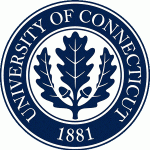This year, the College Fed Challenge competition was virtual. It was a challenging transition to understand the intricacies of new rules and regulations and to pivot in September to be ready by October 9. But the UConn-Stamford team was well-organized, enthusiastic, and well-prepared to put forward the arguments that the current economic situation warrants keeping the target federal funds rate unchanged.
The 2020 team consisted of five Stamford students: Cullen Murphy (ACES, sophomore), You Kim (Financial Management and Economics, senior), Shayla Siljkovic (Linguistics and Philosophy, sophomore), Eileen Zhu (Economics, junior), and Rashana Weerasinghe (Business Data Analytics, sophomore). They worked virtually; very diligently, creatively, and collaboratively. They describe the challenges of this new environment as the loss of a camaraderie of in-person interactions, technical difficulties, and physical isolation. However, the presentation that they put forward combines the intellectual rigor of each member, deep research of economic indicators, and a collective vision of what the forecast of current economic conditions looks like.
You can watch their presentation here.
Our team did not make the next round of the competition this year, which is, of course, disappointing. However, the learning that has occurred was a worthwhile experience. First, each student has developed an expertise in a selected economic indicator or industry: each team member researched, constructed graphs, and made connections with overall economic development as well as with monetary policy implications. Furthermore, students gained highly valuable skills such as critical thinking and teamwork. These are the skills that are transferable to other professional environments such as a graduate school or a workplace.
You can read the students’ reflections here:
Cullen Murphy – Stamford Fed Challenge 2020
You Kim – Stamford Fed Challenge 2020
Shayla Siljkovic – Stamford Fed Challenge 2020
Rashana Weerasinghe – Stamford Fed Challenge 2020
Eileen Zhu – Stamford Fed Challenge 2020
The course that will be used to prepare a team for the next year’s competition is ECON 3492 – Practicum. It is offered every semester. Stamford students who are interested in joining the team should contact Dr. Smirnova. The student’s major does not matter – all majors are welcome! What matters is the desire to learn about the economy and monetary policy, and to be open-minded to work well in a team.

 On February 27, 2020, two Economics students from the Storrs campus (Daija Brunson and Pershae Gilling) and one Economics student from the Stamford campus (Viviana Castillo) got the chance to travel to Cleveland, OH, for a
On February 27, 2020, two Economics students from the Storrs campus (Daija Brunson and Pershae Gilling) and one Economics student from the Stamford campus (Viviana Castillo) got the chance to travel to Cleveland, OH, for a  On October 30th, Economics undergraduate student Mary Vlamis presented her project ‘Can Inclusive Programs Reduce Racial and Gender Discriminations from the Labor Market?’ at the annual
On October 30th, Economics undergraduate student Mary Vlamis presented her project ‘Can Inclusive Programs Reduce Racial and Gender Discriminations from the Labor Market?’ at the annual  This Fall, Professor Smirnova’s Mathematical Economics class in Stamford engaged in collaboration with the local business community. A key element of the course was the empirical project, which gave students hands-on experience in working with data and proposing a solution to a real problem for Stamford-based businesses. Separated randomly into seven teams, students pondered the research question: How to attract and retain Millennial talent in Stamford, CT?
This Fall, Professor Smirnova’s Mathematical Economics class in Stamford engaged in collaboration with the local business community. A key element of the course was the empirical project, which gave students hands-on experience in working with data and proposing a solution to a real problem for Stamford-based businesses. Separated randomly into seven teams, students pondered the research question: How to attract and retain Millennial talent in Stamford, CT?